Inside this Article
1. Plans and Pricing
HostGator Is More Affordable Than FatCow While both FatCow and HostGator offer great prices for long-term contracts, HostGator is cheaper in terms of initial pricing and renewal fees. For instance, FatCow’s shared hosting plan is not only much more expensive than HostGator’s equivalent, but it also renews at nearly 3x the amount for a 12-month period. Even if you sign up for 3 full years, HostGator will still be cheaper than FatCow. HostGator Web Hosting
Plan NameStorageBandwidthFree SSLNumber of SitesPrice
More detailsA free domain name is included with some hosting plans from HostGator
FatCow Web Hosting
Plan NameStorageBandwidthNumber of SitesPrice
More detailsA free domain name is included with some hosting plans from FatCow
HostGator VPS Hosting
Plan NameStorageBandwidthCPURAMPrice
More detailsA free domain name is included with some hosting plans from HostGator
FatCow VPS Hosting
Plan NameStorageCPURAMPrice
More detailsA free domain name is included with some hosting plans from FatCow
Hostinger Web Hosting
Plan NameStorageBandwidthFree SSLNumber of SitesPriceFree Months
More detailsA free domain name is included with some hosting plans from Hostinger
2. Support
Neither Host Has Amazing Support You can rest assured that both web hosts promise 24/7 support via live chat and phone. But still, support is one area where it’s difficult to come up with a FatCow vs HostGator winner. As EIG subsidiaries, they share the same customer service infrastructure as mediocre hosts like Bluehost and JustHost. HostGator’s knowledge bases has hundreds of helpful articles on a variety of topics ranging from design tools and advanced troubleshooting to what you can do to optimize your website. FatCow’s knowledge base is not as comprehensive, but most of the basic topics are addressed. To compare HostGator and FatCow in terms of support, I decided to try out the live chat function for both. This is what happened. With FatCow, I had the pleasure of talking to Jarod, who seemed to answer my questions in a genuine manner. Based on my feedback, he recommended a hosting plan that actually fit my needs.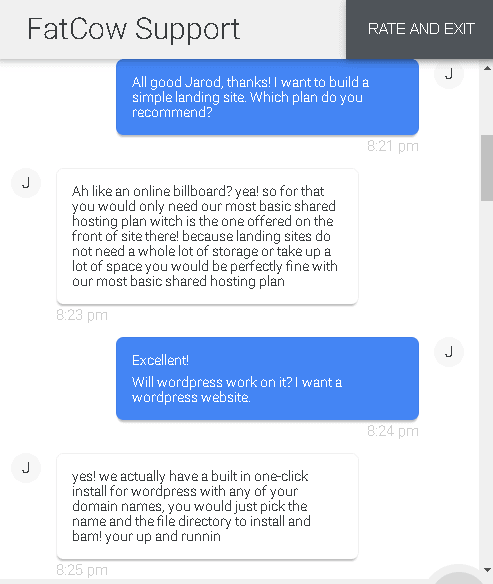
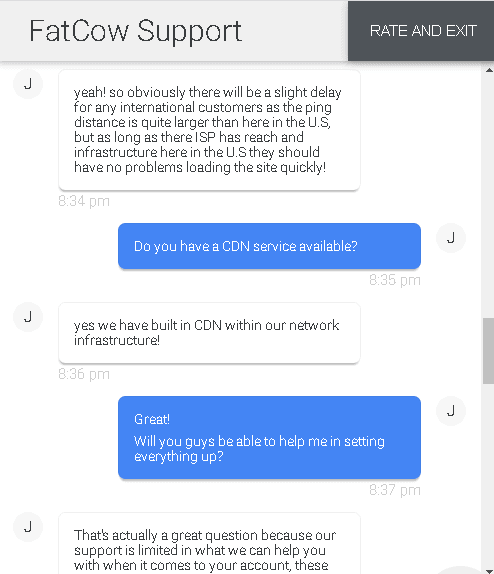
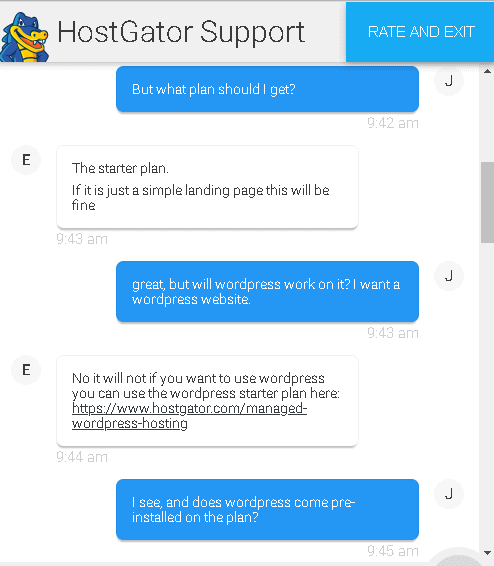
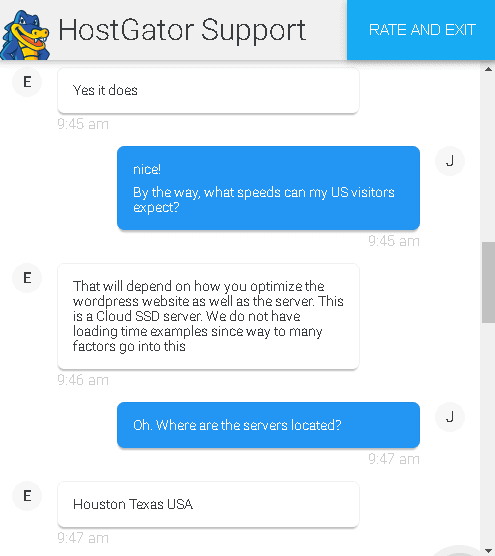
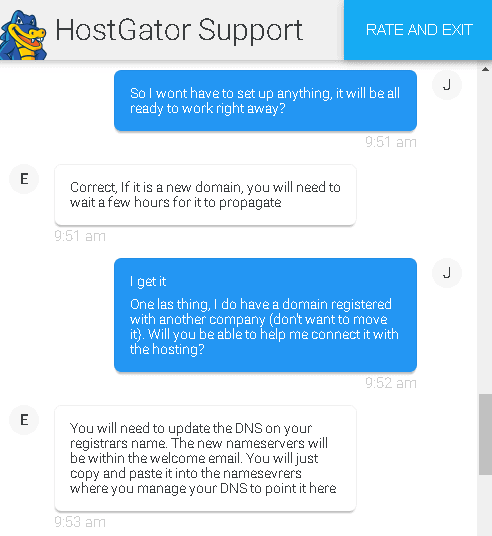
3. Features
FatCow Isn’t Bad, but HostGator Gives You More Freebies HostGator’s plans are not only more affordable than FatCow’s equivalents, but they also give you better features. Let’s take a closer look at what you get with HostGator’s entry shared plan, the Hatchling, as opposed to FatCow’s only shared plan. Even though these plans seem similar at a glance – both include unlimited storage, bandwidth, and emails – there are a few noteworthy differences between them. For one, HostGator includes automatic weekly backups, and one free website transfer. With FatCow, If you already have a website hosted elsewhere, you’ll have to migrate it on your own. You’ll also have to pay extra for the Site Backup add-on. More importantly, all of HostGator’s shared, cloud, and WordPress hosting plans come with SSD storage (which could significantly boost your performance). With FatCow, the shared plan comes with HDD storage and only the WP Essential plan has SSD. When it comes to ease of use, HostGator’s cPanel has the advantage over FatCow’s modified version of vDeck. FatCow pushes pricey add-ons through vDeck, allowing you to try some of them out from the dashboard. It can get annoying, since add-ons continue to appear on your dashboard even though they’re not actually part of your plan. While the FatCow’s homepage says a website builder is included with its shared plan, this is not actually the case. If you want a website builder with FatCow, you have to pay nearly twice the promotional, one-time “introductory rate” every month in addition to the base hosting cost. On the other hand, HostGator’s website builder is included free of charge and it has hundreds of templates to help get you started. Finally, both FatCow and HostGator offer a free domain name if you sign up for at least a year, as well as $200 worth of advertising credits with Bing and Google.| Feature | FatCow | HostGator |
| Hosting Type | Shared, VPS, WordPress, dedicated servers | Shared, VPS, managed WordPress, reseller, cloud, dedicated servers |
| Free Domain | Yes | Yes |
| Free SSL Certificate | Yes | Yes |
| Disk Space | Unlimited | Unlimited |
| Bandwidth | Unmetered | Unmetered |
| Automatic Backups | Paid | Weekly |
| Control Panel | Customized vDeck | cPanel |
| Email Accounts | Unlimited | Unlimited |
| Free CDN | Yes | No |
| Free Site Migration | No | Yes |
| Money-Back Guarantee | 30 Days | 45 Days |
4. Performance
HostGator Is Fast, while FatCow Tries to Keep Up Both web hosts only have servers within the US. FatCow’s data centers are located in Boston, while HostGator’s are in Texas and Utah. Unless you’re using a CDN (content delivery network), this means that people visiting your website from Europe, Asia, or Australia will experience longer page load times. FatCow offers an integrated CDN, according to its support agents, while HostGator does not have one. You can, however, purchase the paid SiteLock upgrade with either service. However, my advice is that you first try to install the free version of Cloudflare and see if that makes things better. If you want the affordability of a shared plan, HostGator is likely to offer better performance than FatCow for the simple reason that they have full SSD storage, while FatCow is still trudging along with HDDs. More importantly, FatCow does not have a service-level uptime guarantee. This means that in the event of server downtime, you won’t be compensated for the amount of time your website is offline. There’s also no guarantee that the server will be up and running within a reasonable amount of time. On the other hand, HostGator has a standard 99.9% uptime guarantee. In the event that you get any less than this, you may be eligible for credits that are worth one month of subscription.
HostGator managed an impressive score in our performance tests. To learn more, you can read our in-depth HostGator review.
Unfortunately, we haven’t had the chance to thoroughly assess FatCow’s performance. To learn more about the web host’s performance-related optimizations, you can read our expert FatCow review.
5. Security
Both Hosts Offer Basic Security, but You Have to Pay for Advanced Modules Both FatCow and HostGator give you access to free SSL certificates from Let’s Encrypt, as well as a spam filter for email. The SSL installation process is straightforward and can easily be done from your dashboard, while the spam filter is set up from the backend by each host, so you don’t have to worry about it. Regrettably, FatCow does not guarantee automatic backups. With HostGator, you receive weekly snapshots, and you also have the option to manually create backups at your convenience to ensure the safety of your work. To access daily automatic backups from either provider, you will need to acquire an additional upgrade (Site Backup with FatCow, CodeGuard with HostGator). If you are looking for additional protection, neither of these web hosts will make it easy on your wallet. Malware and virus scans and SiteLock hacker protection will double your monthly fees with both hosts. On the bright side, HostGator’s servers have custom firewall rules to prevent DDoS attacks in the form of UDP floods. This is included in all plans and you don’t have to pay for it. If you want to benefit from similar protection with FatCow, you have to buy SiteLock.HostGator Isn’t Great, but It Sure Beats FatCow
I wish I had better news for you after this in-depth analysis. Even though HostGator is the winner, neither of these two hosts is great. Still, hosting your website on HostGator will be cheaper, and you’re more likely to get decent performance. You can get more value for better prices with Hostinger, a no-nonsense web host. The features are very similar, but the service is excellent and the performance is probably the best I’ve seen for shared hosting. Neither FatCow hor HostGator managed to grab a spot in our top 10 web hosts. To see the providers that did make the cut, check out our list of the best web hosting services.FatCow
HostGator
Plans and Pricing
Higher than average prices with steep renewals and modest value
Competitive prices with acceptable renewals and good value
Key Features
Unlimited bandwidth, unlimited storage, unlimited emails, vDeck control panel
Unlimited bandwidth, unlimited storage, unlimited emails, cPanel, free website builder
Performance
HDD storage on shared hosting and VPS, no SLA uptime guarantee, two US-based servers
SSD storage on shared plans, 99.9% uptime guarantee, two US-based servers
Security
Free SSL certificates, paid-for backups, additional security add-ons can be purchased
Free SSL certificates, weekly automatic backups, embedded DDoS protection, security add-ons available
Support
24/7 support via live chat and phone, scarce knowledge base
24/7 support via live chat and email, good knowledge base








![How To Start a Clothing Store Online: A 6-Step Guide [2024]](https://dt2sdf0db8zob.cloudfront.net/wp-content/uploads/2024/06/How-To-Start-a-Clothing-Store-Online-img-02-e1718982195142-850x485.png)






![How To Start a Food Blog in 5 Easy Steps [2024 Guide]](https://dt2sdf0db8zob.cloudfront.net/wp-content/uploads/2024/05/How-to-Start-A-Food-Blog-in-5-Easy-Steps-CurrentYear-Guide-e1715367475336-850x487.png)


